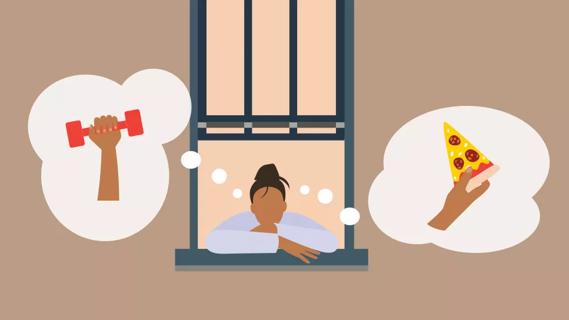A physiological response to your daily life + how to even it out

One day you’re perfectly fine existing on a protein bar and water. The next day you’re scarfing down three sandwiches, a pizza and half a jar of peanut butter.
Advertisement
Cleveland Clinic is a non-profit academic medical center. Advertising on our site helps support our mission. We do not endorse non-Cleveland Clinic products or services. Policy
Why does it sometimes feel like your appetite changes more than the weather?
Registered dietitian Kate Patton, MEd, RD, CCSD, LD, says that an increase or decrease in your appetite is your body’s response to how you’re living your life – what foods you’re eating, your stress level, your mood and how active you are. Your appetite can even be dictated by your emotions.
One of the main influencers of your appetite is eating a balanced diet, but other things can play a factor in how hungry (or not hungry) you feel.
Appetite changes can come from:
“The first thing I would ask someone who came to me and said their appetite was all over the place would be ‘how balanced is your diet?’” says Patton. “If you’re eating refined carbs and not enough protein, fiber or fat – the carbs will all digest faster, which will make you hungry pretty often.”
Pay attention to your eating habits and how often you’re truly feeling hungry. You might notice that on days when your diet is better, you feel fuller longer. There is usually a correlation between what you’re eating and your appetite.
Advertisement
To prevent annoying appetite shifts, focus on eating balanced meals and snacks.
Also pay attention to timing, says Patton. If you’re going for long periods of time without eating, by the time you do feel hungry you might be starving. And when you’re starving there’s a bigger chance you could overeat.
Appetite changes also have to do with your activity level. If you’re super active (maybe you went on a longer than normal hike yesterday) or even if you’re training for a marathon, you might find yourself hungrier than normal.
“Depression, stress and anxiety can all lead to appetite changes,” says Patton. “If you’re battling a mental health condition or even an eating disorder, it’s important to seek help and find ways to cope.”
If your appetite is constantly changing and it’s starting to interfere with your life – like causing significant weight loss, weight gain or fatigue, see your doctor or a dietitian.
Also if you find yourself obsessed with food, constantly thinking about what you’ll have next or if you’ve developed excessively strict eating habits – it’s best to check in with your doctor.
At the end of the day, food is a necessary part of living a healthy life and your appetite plays a big role in it. Having a weird relationship with your diet and nutrition could spell trouble not only physically, but emotionally and mentally as well. Learning to cope with your feelings, stress and mood is an important pillar of wellness.
Advertisement
Learn more about our editorial process.
Advertisement

With a focus on internal cues for hunger and fullness, this eating style may revolutionize your relationship with food

Review the ingredients, watch for sugar and fat, and choose one with the right amount of protein for your needs

Getting the hang of portions can help you better understand how much to put on your plate

A typical recommended balanced diet is half fruits and veggies, a quarter protein and a quarter grains

Foods high in protein, fiber and water can help keep hunger at bay

This quirky food trend is harmless, as long as you’re getting enough protein, fiber and healthy fats

Learning about your relationship with food can help improve your eating behaviors and patterns

Eating mindfully, sipping water and chewing slowly can help your brain catch up with your stomach

Wearing a scarf, adjusting your outdoor activities and following your asthma treatment plan can help limit breathing problems

Your diet in the weeks, days and hours ahead of your race can power you to the finish line

When someone guilt trips you, they’re using emotionally manipulative behavior to try to get you to act a certain way